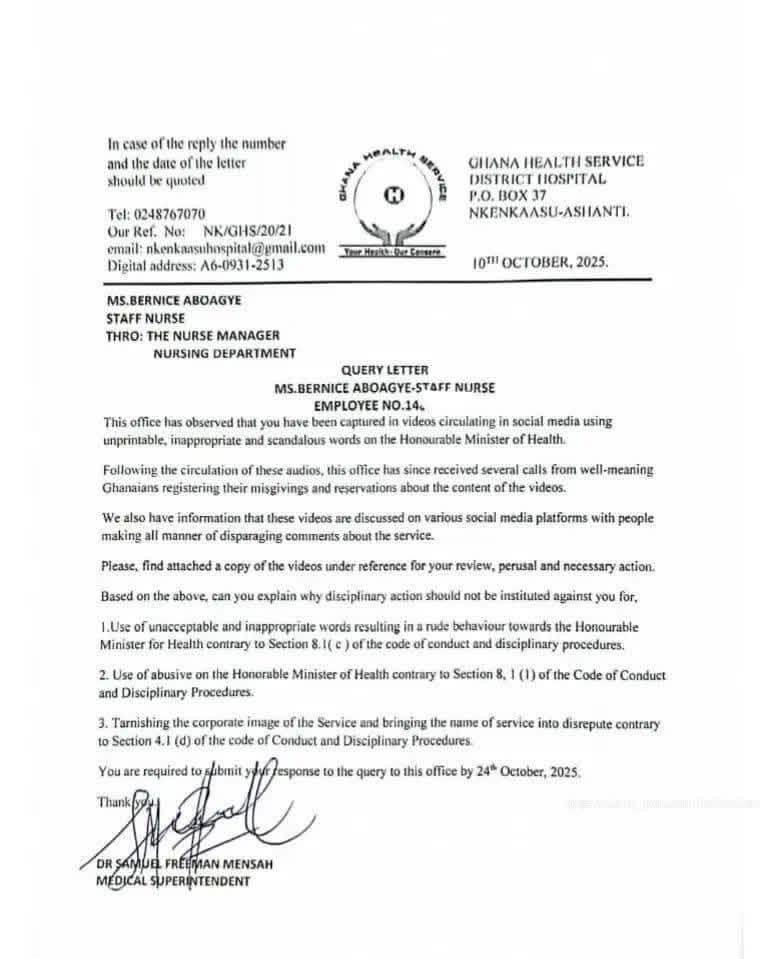The Ghana Health Service (GHS) has found itself at the center of a heated national debate following its decision to issue a formal query to a nurse whose protest video went viral. The incident, which has sparked widespread commentary both online and offline, reveals the deep frustrations within the health sector, particularly around issues of delayed salaries, professional recognition, and the strained relationship between healthcare workers and political leadership.
At the heart of the controversy is Bernice Aboagye, a nurse at Nkenkansu Hospital, who was captured in videos circulating on social media using what the GHS described as “unprintable, inappropriate, and scandalous” language directed at Health Minister Kwabena Mintah Akandoh. The Service, in a memo dated October 10, 2025, expressed grave concern over her conduct, noting that the videos had triggered “widespread public backlash and negative commentary online”.
The GHS has given Ms. Aboagye until October 24, 2025, to respond formally to the allegations. The query letter cites three specific breaches of the Service’s Code of Conduct and Disciplinary Procedures; rude behavior towards the Minister in violation of Section 8.1(c), use of abusive language in breach of Section 8.1(l), and tarnishing the corporate image of the GHS contrary to Section 4.1(d). Copies of the video clips were attached to the query, leaving little doubt about the evidence being weighed against her.
The viral video did not emerge in isolation. It was part of a broader wave of protests by nurses and midwives across the country, many of whom have gone months without receiving their salaries. In her emotional outburst, Ms. Aboagye accused the Health Minister of dismissing their concerns with contempt. According to her, during one exchange, the Minister allegedly brushed aside complaints about unpaid wages with the remark: “don’t vote”.
This allegation, whether accurate or not, has fueled public anger and amplified perceptions of disconnect between political leaders and frontline health workers. For many Ghanaians, the nurse’s frustration resonated deeply, reflecting the lived reality of professionals who continue to serve despite financial hardship. The video of Ms. Aboagye shedding tears while narrating her ordeal of unpaid salaries has been widely shared, turning her into a symbol of the sector’s grievances.
By issuing a formal query, the GHS has sought to reassert professional standards and protect its institutional reputation. The Service emphasized that the nurse’s conduct had “brought its reputation into disrepute” and risked eroding public trust. Yet, this disciplinary approach has itself become controversial. Critics argue that the Service is focusing on silencing dissent rather than addressing the root causes of the protests—namely, the persistent delays in salary payments and the broader neglect of healthcare workers’ welfare.
The public reaction has been polarized. Some citizens have contacted the GHS to express disapproval of Ms. Aboagye’s language, insisting that public servants must maintain decorum even in moments of frustration. Others, however, see her actions as a courageous act of defiance, a raw expression of the anger and despair felt by many in the profession. The 126 comments on the GhanaWeb article reporting the query reflect this divide, with some condemning her tone while others defend her right to speak truth to power.


This incident comes at a time when the government has promised to capture
nurses’ and midwives’ salary arrears in the next national budget. While this pledge offers some hope, skepticism remains high given the repeated delays and unfulfilled assurances in the past. The protests and the viral video have therefore become a rallying point for healthcare workers demanding not just payment of arrears but also systemic reforms to ensure timely remuneration and improved working conditions.
The clash between the nurse and the Health Minister also reflects a deeper tension between political authority and professional autonomy. For many health workers, the sense that their sacrifices are being trivialized or dismissed by leaders is as painful as the financial strain itself. In this light, Ms. Aboagye’s protest can be seen not merely as an act of misconduct but as a symptom of a wider crisis of trust.
The GHS now faces a delicate balancing act. On one hand, it must uphold professional standards and ensure that its staff maintain respect in their interactions with public officials. On the other, it cannot ignore the legitimate grievances that fuel such outbursts. To discipline Ms. Aboagye without addressing the underlying issues risks deepening resentment and alienating the very workforce upon which the health system depends.
The incident also raises broader questions about freedom of expression for public servants. While codes of conduct rightly demand professionalism, they must also allow space for workers to voice their frustrations, especially when those frustrations stem from systemic failures. The challenge lies in finding mechanisms for constructive dialogue that prevent such grievances from spilling into viral confrontations.
The query issued to Bernice Aboagye is more than a disciplinary matter; it is a flashpoint in Ghana’s ongoing struggle to reconcile ambitious health policies with the lived realities of its workforce. Her tearful testimony about unpaid salaries, coupled with the allegation that the Minister dismissed concerns with a flippant “don’t vote,” has struck a chord with many Ghanaians.
As the October 24 deadline for her response approaches, the outcome will be closely watched not only for its implications on her career but also for what it signals about the government’s approach to dissent within the health sector. Will the GHS and the Ministry of Health use this moment to engage meaningfully with workers’ grievances, or will they double down on disciplinary measures that may silence individuals but leave systemic problems unresolved?
The answer to that question will shape not only the fate of one nurse but also the credibility of Ghana’s health institutions at a time when public trust is more vital than ever.
Sources: Ghana Health Service issues query to nurse in viral protest video
Gov’t to capture nurses, midwives’ salary arrears in next budget



